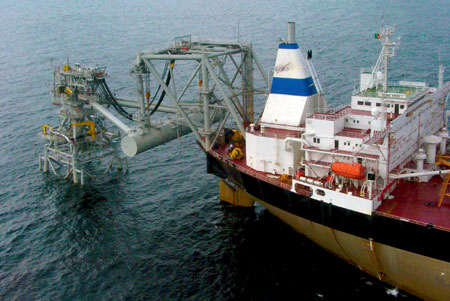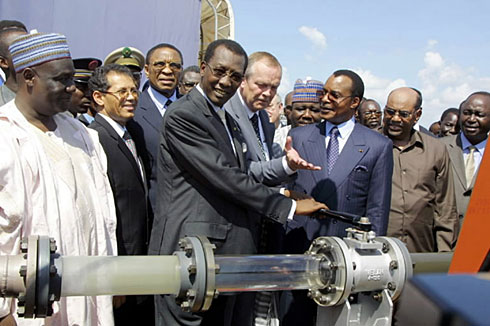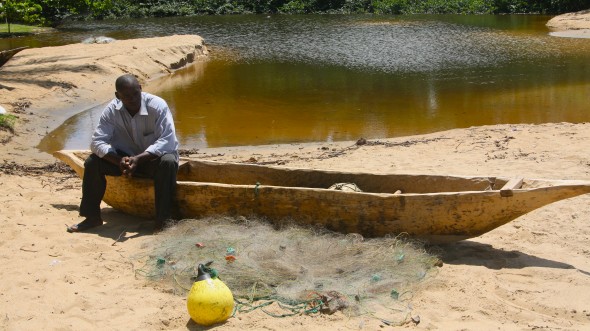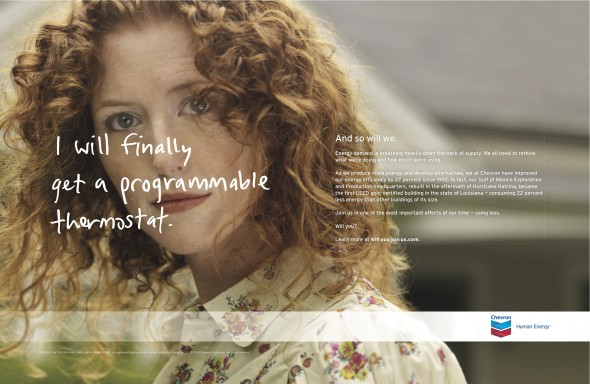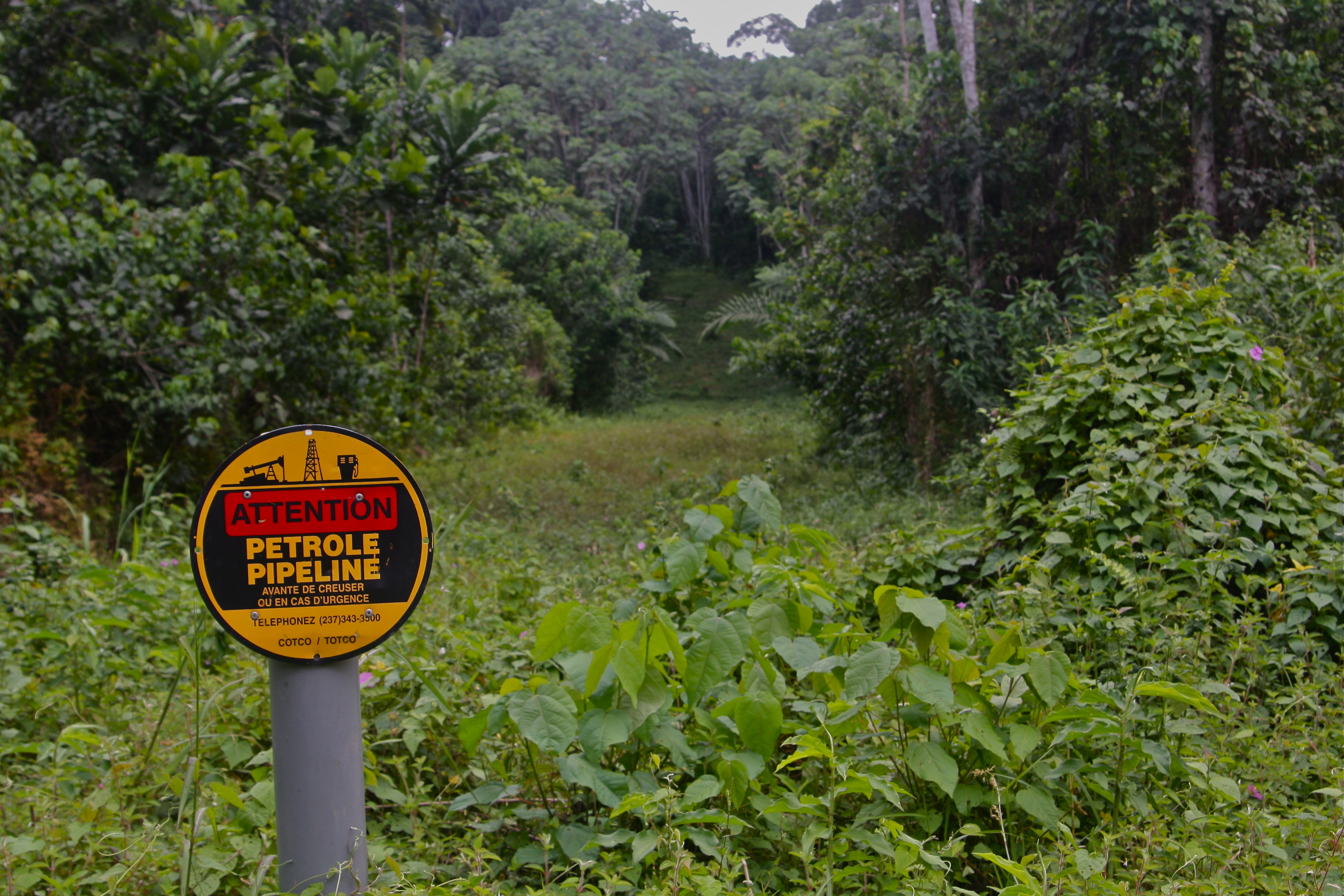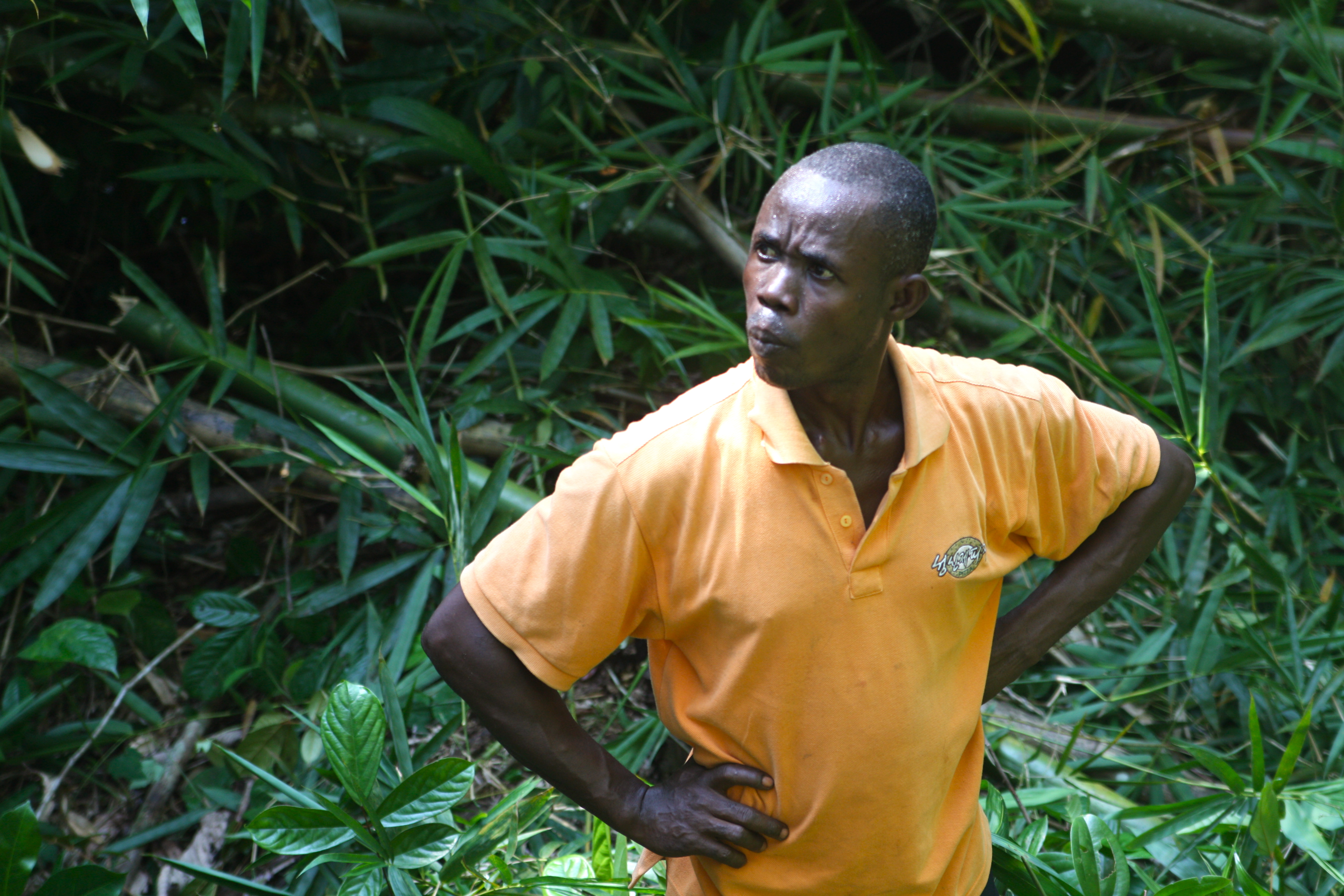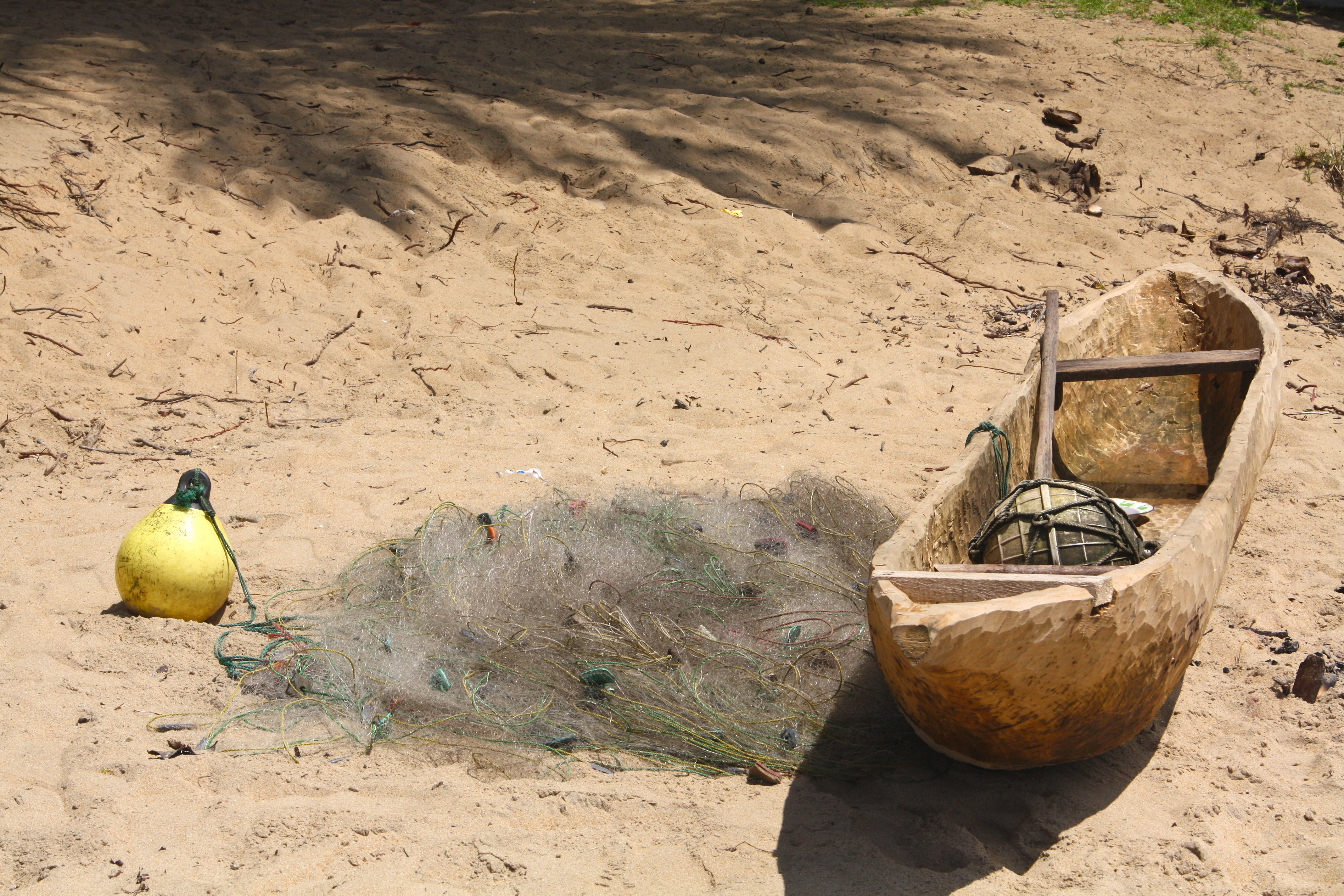Oil…A Pipeline to Prosperity?
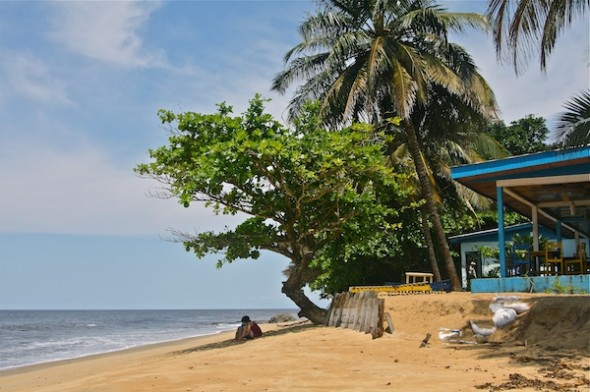
Tourists at Bume Beach, opposite the pipeline's marine loading terminal. Photo by Christiane Badgley
I have produced a short film for PBS/Frontline World to mark the 10th anniversary of World Bank engagement in the Chad-Cameroon Oil Development and Pipeline Project. Cameroon: Pipeline to Prosperity? revisits the story of the “model” oil for development project. Ten years ago the oil companies and the World Bank promised that this project would break the resource curse and prove to the world that oil could be a force for good…
What has happened? Watch the film to see how Chad’s oil has impacted life along the pipeline in Cameroon.
This work was produced with support from Frontline World, The Pulitzer Center on Crisis Reporting and The Center for Investigative Reporting.
Cameroon: Pipeline to Prosperity? is the first installment in my ongoing exploration of Africa’s booming oil industry, Pipe(line) Dreams. You can read more about the project on the website.
Please support my work on this project by viewing the film and leaving your feedback. It is crucial to show funders that this work matters!
The U.S. now imports more oil from Africa than from the Middle East, with oil accounting for more than 80% of all African imports into the country. African is soon expected to account for close to one quarter of U.S. oil consumption.
With Africa increasingly seen as the next frontier of oil exploration, there is no shortage of oil companies lining up for financing from the World Bank Group. Oil drilling has begun in Ghana with support from the World Bank Group; loans may soon be approved for Uganda. New oil has been found in Chad, Cameroon, Nigeria, Angola — even Sierra Leone. The list goes on, with government and corporate officials in each country promising to make oil work for the people.
But in countries lacking accountability, with weak legal systems and lax or nonexistent environmental regulation and enforcement, is oil really a viable development option? And is there a valid reason that public funds subsidize these projects? Both the U.S. and China depend heavily on African oil, yet we rarely see anything about how that oil dramatically transforms African communities, economies and environments. Pipe(line) Dreams, a timely and globally relevant story, will bring much needed attention to the rapidly expanding oil industry in Africa.
Oil Spill near Kribi, Cameroon
A new oil spill was reported at the marine loading terminal offshore from Kribi at 1:45 am on April 22nd.
According to COTCO, the “minor spill” occurred during a violent storm. The transfer of oil from the loading terminal (FSO) to a waiting tanker was halted due to bad weather. High waves washed some “residual oil” from the deck of the waiting tanker. Again, according to COTCO, less than five barrels total were spilled and the oil was immediately cleaned up.
No oil has been reported on the coast, but fishermen did report seeing a sheen of oil offshore.
Several Cameroonian NGOs have released a statement deploring the lack of communication between COTCO and the local populations as well as the lack of any statement or information from the Cameroonian government. The Comité de Pilotage et de Suivi des Pipelines (CPSP), the Cameroonian authority responsible for the pipeline, has not made any public comments regarding the spill. With no information from the government and no journalists allowed near the marine loading terminal, it is extremely difficult to verify COTCO’s information.
In November 2009 the Cameroonian government adopted a national oil spill response plan. This plan, required by the World Bank, should have been in place before oil began to flow along the pipeline in October 2003. The Cameroonian government has not made the plan public and many civil society activists believe the plan remains non-operational. Samuel Nguiffo, from the Center for the Environment and Development, points to the unfolding disaster in the Gulf of Mexico as a warning: “It is urgent that the government increase its capacity to respond to a disaster and make the oil spill response plan operational.”
In the event of a major spill, several million barrels of oil could end up in the Atlantic ocean 12 km. off the coast of Kribi, Cameroon’s main tourist destination and an important fishing and sea turtle nesting zone. The thought of a spill anywhere is terrifying, but watching what’s going on in the Gulf of Mexico now makes me extremely uneasy about Cameroon. Of course the situation in the Gulf is particular, but one clearly sees that controlling an oil spill, even with the best equipment and ample manpower, is incredibly difficult. Any significant spill at the marine loading terminal in Kribi would likely be an ecological (and economic) disaster of major proportions.
It’s important to remember that the offshore marine loading terminal at Kribi (the FSO), is a single-hulled refurbished tanker. Today all tankers, including those used as FSOs, must be double-hulled — an additional protection against spills.
Mini update: News from Chad
Happier days…
I haven’t posted anything in a while, as I’m in the midst of editing. I’ll post more material soon. In the meantime, here’s some news from the recent IMF staff mission to Chad (March 4-17):
“Economic activity remained sluggish in 2009, but inflation increased further, owing to food prices. Low rainfall, and therefore agricultural output, plus the trend decline in oil production led to a contraction in real GDP of about 2 percent. The bad harvest could imply food shortage for up to 2 million people (18 percent of the population). The need for additional food is estimated at between 80,000 to 100,000 metric tons, for which the government has requested external assistance.
“The global financial crisis affected Chad mainly through the ensuing decline in oil prices. The fiscal position deteriorated sharply in 2009 to a deficit of about 20 percent of non-oil GDP as the government maintained spending levels in the face of a fall-off in oil revenues by almost depleting its oil savings and borrowing from the central bank…Overspending on security and investment in 2009 absorbed an important part of the resources that had been lined up to finance the 2010 budget.”
Hardly looks good. Chad remains desperately poor, 18% of the population risks going hungry and the government can’t pay its bills. All this despite the benefits that oil brought to the country.
Money in, money out. I think this is what economists’ call the “resource curse”, you know, what wasn’t going to happen this time…
Crude Awakening, Part two
The World Bank-supported Chad-Cameroon oil pipeline looks a lot different on the ground than it does from offices in Washington, D.C. Is the project a success? Depends who you ask!
One thing is certain: the controversy surrounding the “model” oil development project has hardly died down.
This video looks at ongoing compensation problems around Kribi, Cameroon. The Cameroonian Oil Transportation Company, COTCO (ExxonMobil), is responsible for compensating locals for lost lands and revenues.
Traveling from the fishing village of Bumé where locals have been suffering since pipeline construction crews destroyed their fishing grounds, to the Bagyeli pygmy villages in the rainforest, where the Bank-mandated, “Indigenous Peoples’ Plan”, has been stalled for years, I met one angry resident after another.
Today people are especially frustrated as they feel they have no recourse. The government is unresponsive; COTCO (ExxonMobil) is unresponsive. There’s nowhere for people to go with their complaints. It seems the world has forgotten about the Chad-Cameroon oil pipeline.
2010 A New Year
Fragile existence. This is the story of life along the pipeline. Whatever happens to the global economy, the price of the barrel or ExxonMobil’s profits in 2010, life here will remain difficult. But the oil won’t stop flowing any time soon and as long as the pipeline is operational, there are opportunities for progress.
Peoples’ voices will be heard, their stories shared. Increased awareness, increased transparency, pressure from stockholders – these are all real possibilities that can lead to change. Oxfam has been actively involved in efforts to promote transparency in the extractive industries, for example, and recently launched a “Follow the Money” campaign. The Extractive Industries Transparency Initiative is moving forward.
Of course any change on the ground will be minimal at best, but let’s all work to make 2010 a year with a bit more social and environmental justice where it’s needed most.
Chevron in the News
I don’t write much about Chevron, as ExxonMobil is the lead-operating partner on the Chad/Cameroon Development Project. But Chevron is one of the consortium members, with a 25% ownership stake in the venture.
This week’s East Bay Express features an article by Peter Asmus, The Case Against Chevron. The article describes an unprecedented campaign by nonprofit groups targeting Chevron’s global operations.
The article doesn’t mention Chad or the pipeline; activists working on the Chad/Cameroon Development Project usually focus their attention on ExxonMobil. But it’s worth reminding people that the Chad Oil Project includes three private partners: ExxonMobil, Petronas and Chevron.
I found Asmus’ article interesting as he devotes part of it to discussing if and how Chevron can become part of the solution, including what he calls, A 12 Step Program for Chevron.
A similar program could be drawn up for the Chad/Cameroon Development Project. The challenge, of course, is getting a company as powerful as ExxonMobil to hear, let alone, heed the call for change.
A new article on the Chad-Cameroon Oil Pipeline
I read a strong piece today on AlterNet, A Humanitarian Disaster in the Making Along the Chad-Cameroon Oil Pipeline — Who’s Watching?, written by Brendan Schwartz and Valery Nodem who I recently had a chance to meet in Yaoundé.
The article provides an excellent summary of much of what’s wrong with the Chad-Cameroon oil pipeline… and describes many of the ongoing issues that prompted me to begin work on the Pipe(line) Dreams project.
Missing Fish
Fishing in Kribi isn’t what it used to be. There are certainly multiple reasons for the decline in fish stock, but everyone here singles out the pipeline as the main culprit. The pipeline cuts right through the middle of the coastal village of Bume, just south of Kribi, on its way to the marine loading terminal 12 kilometers offshore. The residents of Bumé, who depend entirely on fishing, blame the pipeline for killing their livelihood.
There are two types of fishing in the Kribi area and the pipeline impacted each differently. The hardest hit are the small, village fisherman — like the residents of Bumé — who put their nets out just offshore. These fishermen do not have motor power; they paddle their small dugout canoes out to sea and are unable work more than a few kilometers from shore.
They used to catch the fish that lived in the reef just offshore. That reef was blasted away during pipeline construction and the fish have never come back. Using their traditional fishing methods, local fishermen now pull in only a few kilos of fish at a time. Sometimes, they pull in nothing at all.
As I mentioned in an earlier post, the initial pipeline plans did not include the destruction of the reef. As no one from ExxonMobil would speak to me, I could not find out why this, a significant environmental impact, was not not part of any early reviews. The shallow waters of the coast here are lined with rocky offshore reefs and the Bumé reef was clearly visible. If any local fishermen had been interviewed, they would have talked about the importance of the reef for local fishing.
C is for Corruption
This is an angry man. He’s standing in a 4 million CFCA (US$ 9000) fish pond. Well, it was supposed to be a fish pond.
When the last section of the pipeline was laid from the beach at Kribi to the offshore marine loading terminal, construction crews blasted away the reef at Bumé, the fishing village at “ground zero.” The fish left the area and for the population of Bumé, entirely dependent on fishing, this was a disaster.
The original pipeline plans did not include the reef’s destruction, so there was no mitigation plan in place when the crews came through. After much discussion, the consortium offered to construct two ponds for fish farming. Never mind that the villagers of Bumé are fisherman, not fish farmers, and that they have neither the skills nor the resources for aquaculture. These artisanal fishermen paddle out with their nets out once or twice a day, catching relatively small amounts of fish in the shallow waters. This is subsistence fishing: they bring in just enough to eat and, if all goes well, sell a few fish each day.
What’s a Tree Worth?
Godefroy Edzoa is the traditional chief of Ekabita. The pipeline crosses straight through the fields of Ekabita where people grow cocoa, avocados, mangoes, safou, papayas, and a variety of crops including bananas, corn, cassava, squash and peanuts.
Edzoa tells me that when the pipeline people came to Ekabita, they told residents there would be compensation for damaged crops. They also said that once the pipeline construction was completed, residents could farm their lands again. However, no fruit trees could be planted on the 30-meter wide easement, as tree roots could damage the pipeline. Farmers were told that the easement would be cleared several times a year, probably after harvests, but were given no firm details. Even today farmers can not tell me exactly when the easement will be cleared, as the calendar seems to change each year.
Deby’s Surprise Visit
The President of Chad, Idriss Deby, made a surprise visit to Yaounde on October 28th. As the visit was announced only 24 hours before Deby’s arrival, the private press was full of speculation on what urgent matter brought Deby to Cameroon.
Officially, Biya and Deby held a short, private meeting to discuss bilateral cooperation and the receding waters of Lake Chad, an item that both countries will bring up at the Copenhagen climate conference. Unofficially, the corruption scandal at the Bank of Central African States, in which a Chadian minister may be implicated, as well as the renegotiation of pipeline contracts, could have been items for discussion.
Pipeline Dreaming
What happens when a major American oil company comes through two poor African countries with a project to drill for oil in one and transport it across the other?
Dreams. Fantasies. Unrealistic expectations. False hopes. As Samuel Nguiffo, founder of the Center for the Environment and Development in Yaounde told me, “People hear oil, America, dollars, jobs. They hear it’s a 25-year project. From there it becomes money and jobs for everyone for 25 years.”
Langue de bois
I’ve been in Cameroon for a week now, and there’s lots to talk about. I have to begin, though, with my efforts to get anyone connected with the pipeline project to speak to me. As I’ve been spending many hours in waiting rooms, I felt that this photo kind of summed up a good part of my week.
“Langue de bois” is a French expression: literally, a wooden tongue. Cliches. Hackneyed phrases. Spin. Waffle. What politicians and business leaders do when they want to talk without saying anything, avoid answering difficult questions, steer our attention away from unpleasant subjects, etc.
“As you can imagine, ExxonMobil receives many worthwhile requests from news organizations for interviews. Unfortunately, it is impossible to respond affirmatively to all these requests. Due to timing and other business constraints, representatives of Esso Chad will not be available to participate in the opportunity you present. However, for information, I’ve enclosed a case study of the project, as well as a 2008 news release that notes the benefits of the project.”
En route
 Here I am watching the Paris drizzle from terminal 2C at Charles de Gaulle airport, waiting for my flight to Douala. After months of discussions and proposal writing and waiting for the rainy season to (almost) end, I’m finally off to Cameroon.
Here I am watching the Paris drizzle from terminal 2C at Charles de Gaulle airport, waiting for my flight to Douala. After months of discussions and proposal writing and waiting for the rainy season to (almost) end, I’m finally off to Cameroon.
My plan is to eventually travel the length of the pipeline, to see up-close how this project has really affected people in Chad and Cameroon. On this first trip, I’ll explore the last 250 kilometers of the pipeline, a section that passes close to Yaoundé, the capital of Cameroon, and then continues through the rainforest to the town of Kribi, on the Atlantic coast.
The forest between Yaoundé and Kribi is home to the Bagyeli, one of Cameroon’s two pygmy populations. The World Bank and the ExxonMobil-led consortium were convinced the pipeline project would help the Bagyeli. As part of the mitigation process, the pipeline consortium established an indigenous peoples’ foundation to run health and education programs for the Bagyeli. Many environmentalists and civil society activists, on the other hand, feared that the pipeline would disrupt the Bagyeli’s already fragile existence. As many Bagyeli continue to rely on the forest for their food and their livelihoods, any damage to the local ecosystem could be devastating.
This is one story that I’ll be looking at in the coming weeks.
But now, it’s boarding time.
Cargo of Hope
In October 2003, Exxon Mobil took out a page in the New York Times to announce the first shipment of crude oil from Chad:
“Voilà. A new chapter in world energy markets opened in early October when the first cargo of crude oil from the African country of Chad was loaded onto a tanker off the coast of Cameroon….And so with the first oil loaded, an extraordinary project begins to supply energy to the world as well as a better life and a cargo of hope to the people of Chad and Cameroon.”
You can see the entire page at: Voilà!
Paradise and the Pipeline
Kribi. It could be paradise. The small beach town on Cameroon’s Atlantic coast is one of the country’s prime tourist attractions. The dense rainforest stretches almost to the water’s edge; a strip of white sand beach is all that separates the greens of the forest from the turquoise waters. Just south of town the famous Lobé waterfalls tumble over black volcanic rocks directly into the ocean. Market women sell and prepare fish right off the boats at the town’s small port.
The first time I visited Kribi was in December, 1994, and the beauty of the place was stunning. Of course, most of the town was rundown and ramshackle. Electricity ran intermittently and the water was not fit to drink. Unfortunately this was (and is) the story of much of Cameroon. But Kribi managed somehow to have a certain charm and people spoke proudly of their little corner of paradise.

